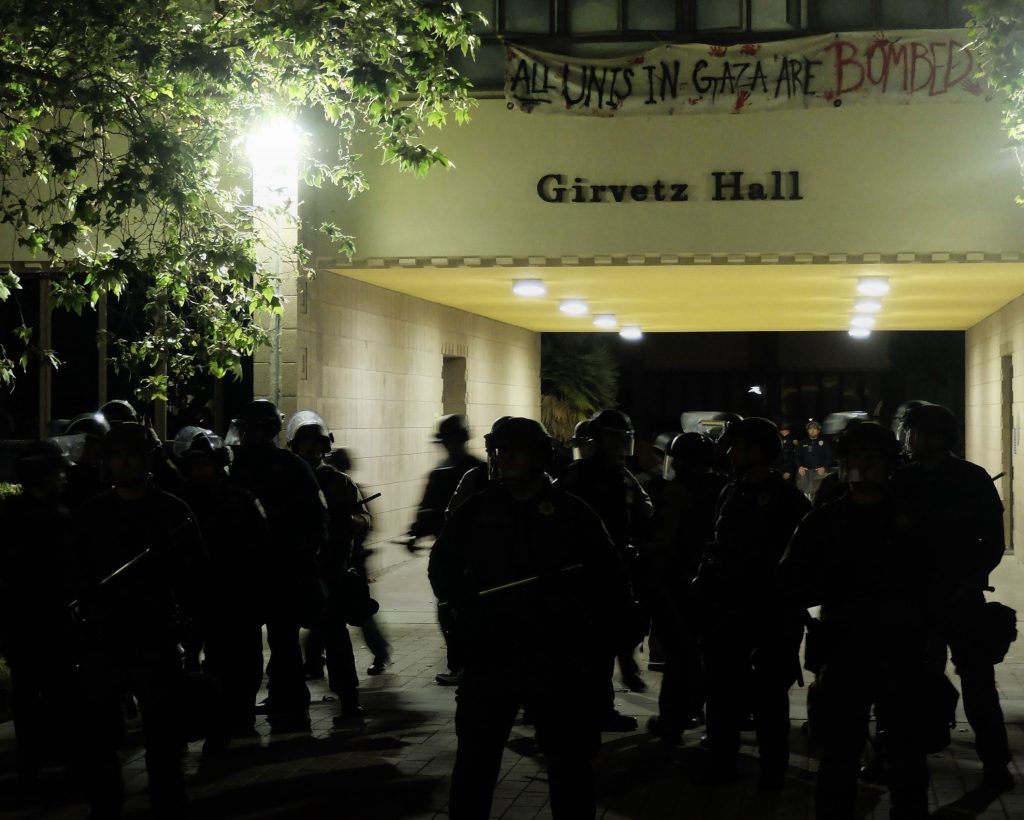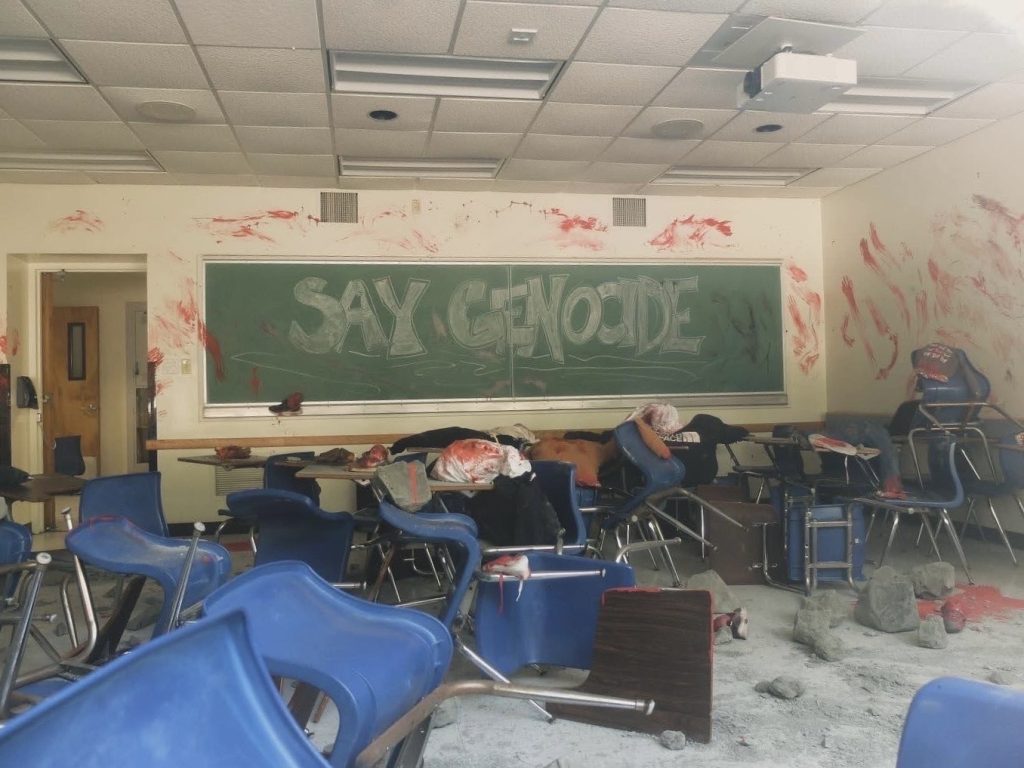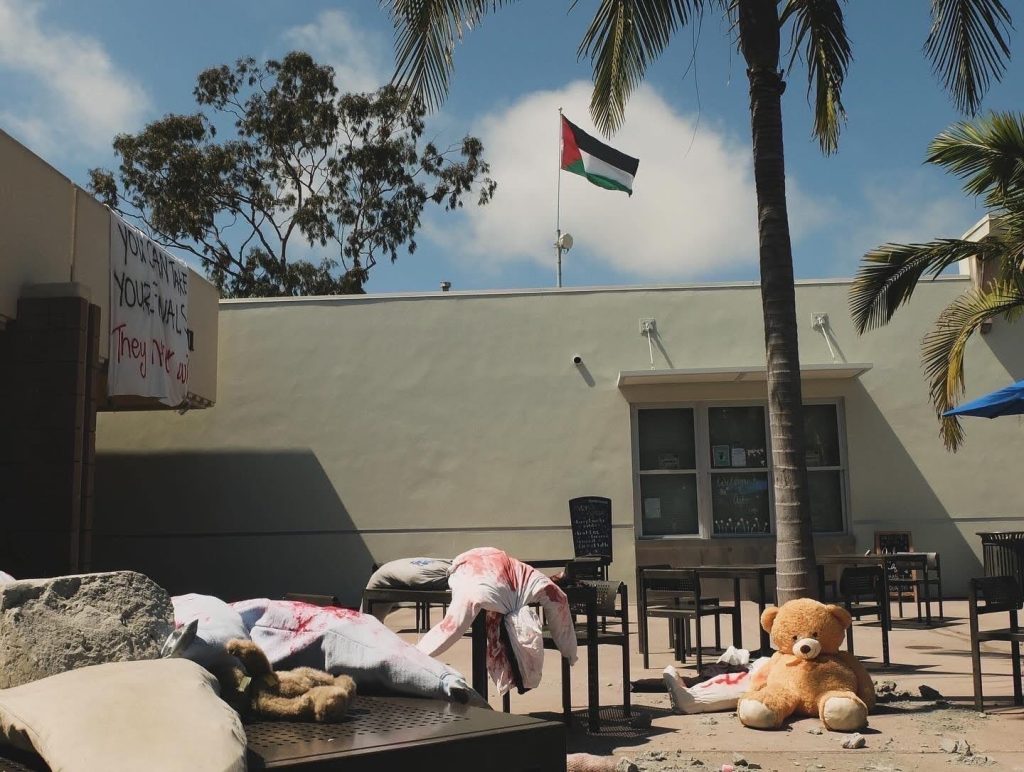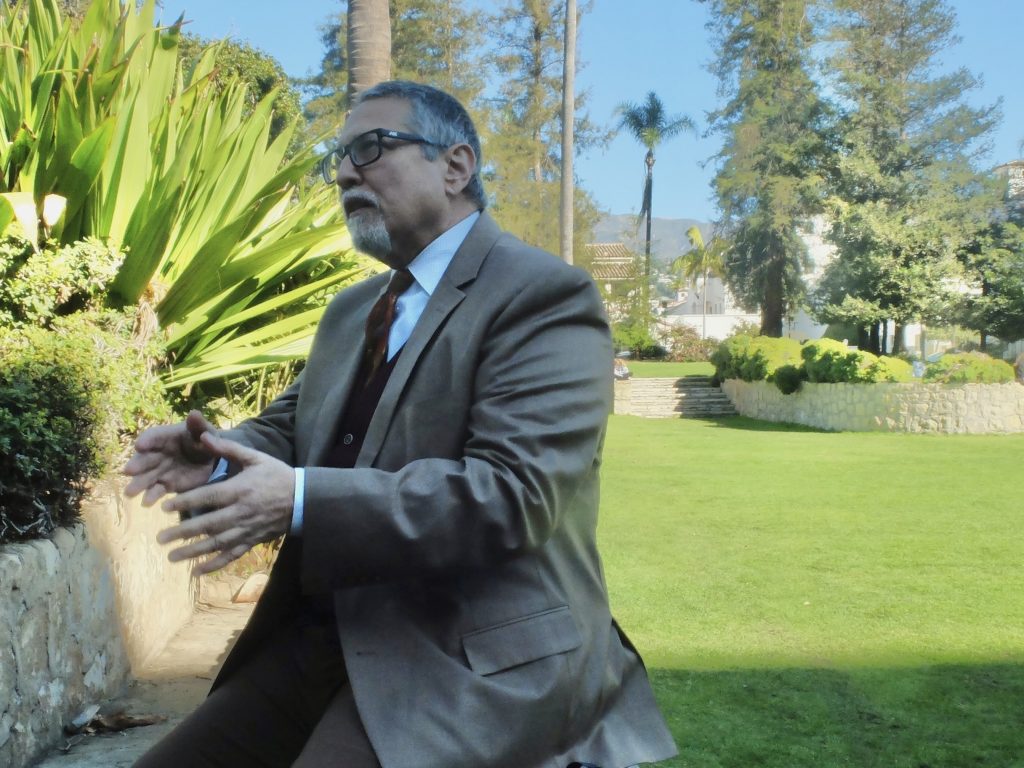Warrant Sought by UCPD for Pro-Palestinian Instagram Accounts Draws Criticism
Police arrive after protestors occupied Girvetz Hall for two days. | Brandon Yi/KCSB News
Written by Joyce Chi and Rosie Bultman || Listen to the story on SoundCloud
—
The University of California Police Department (UCPD) is seeking a search warrant to access two pro-Palestine Instagram accounts. The American Civil Liberties Union (ACLU) warns this warrant would chill free speech on college campuses.
SNOW: A police department is watching closely is tracking people is monitoring potentially where they’re going what they’re doing who they’re talking to like that surveillance has a chilling effect.
That’s Jacob Snow, senior staff attorney at the ACLU of Northern California, which, along with ACLU SoCal, filed an amicus curiae brief against the warrant.
The instagram accounts targeted by the warrant are @ucsbliberatedzone, the account of the encampment set up at UC Santa Barbara in May; and @saygenocideucsb, the account allegedly associated with protestors who occupied Girvetz Hall on June 10th and 11th of this year.
UCSB’s Media Relations Manager Kiki Reyes confirmed the UCPD is trying to access these two accounts as part of their investigation into the takeover of Girvetz Hall. Protestors had occupied the building and created graphic art installations depicting the aftermath of bombings and missile strikes. They had one main objective: that UCSB publicly declare the War on Gaza a genocide. The charges the UCPD seeks include felony trespassing, burglary, conspiracy, vandalism, and kidnapping.
Art installations seen during the Girvetz Hall takeover. | Joyce Chi/KCSB News
The search warrant would grant UCPD the IP addresses and contact information of anyone who has interacted with the ucsbliberatedzone and saygenocideucsb accounts, from when the accounts were created up until September 10th. This includes people who followed the accounts, liked its posts, or even just viewed the accounts.
Here’s ACLU attorney Jacob Snow again.
SNOW: When it comes to assurances like that, that the government isn’t going to violate people’s rights. Students and other people in the Santa Barbara community are right to be skeptical, given the fact that this warrant sweeps so much farther than it needs to, and already violates people’s rights.
Private criminal defense attorney Addison Steele is representing a client – known only as a “John or Jane Doe” – who could be affected if the UCPD has access to the Instagram accounts. Steele is trying to “quash,” or stop, the search warrant. He said by potentially revealing their identity, this John or Jane Doe could be interrogated just for engaging in constitutionally-protected speech. But if his defense is successful, it would not be only his client who benefits.
STEELE: Every single person who merely looked at these Instagram pages is on my coattails, right? Because if I succeed, their information is not going to be given up. So if those people looked at the Instagram page, then yes, they are collaterally also being defended, even though they’re not my client.
A hearing was held regarding the warrant on Friday, November 22nd at the Santa Barbara Superior Court, where around 20 to 30 people showed up in opposition to the warrant.
At the hearing, Steele criticized the search warrant on two grounds. First, the scope of the warrant, which he argued was much too broad and would allow UCPD to question anyone even tangentially connected to the accounts.
STEELE: The search warrant asked to find out everybody who merely looked at the Instagram pages, give the police that person’s name. Well, that’s pretty scary. The police are gonna come knock on your door because you looked at some political speech? I mean, that doesn’t sound like America to me.
Private civil attorney John Miller argued for the UCPD at the hearing. Miller contended that the scope of the warrant had to be broad in order to identify those responsible for occupying Girvetz. Deputy District Attorney Anthony Davis also said that after the UCPD had completed its investigation, it would seal off the IP addresses of other users not relevant to the proceedings, preventing others from accessing the data.
Steele criticized this, and said it gave the UCPD arbitrary discretion to seal the data as they saw fit, without any judicial oversight.
The second reason why Steele says he wants to block the search warrant is a lack of probable cause. On this point, there are two questions that the court has to decide: did felony crimes take place when Girvetz was taken over? If so, are there connections between those felonies and Instagram? Steele says no to both.
STEELE: I think UCPD should be able to have access to nothing. I think they should be able to have access, if somebody gets on one of those posts and says “I committed $40,000 worth of vandalism in Girvetz Hall during that occupation.” That’s probable cause. They should get that. The problem is, that didn’t happen.
Steele argued against the charges of conspiracy, burglary, and kidnapping. He called the burglary charge, quote, “silly at best,” and said there was no proof that things were stolen or that protestors went into Girvetz with the intent to steal or commit a felony.
Miller disputed this and maintained the takeover was an organized effort. By explicitly writing in a post that they had taken over Girvetz, Miller argued this was proof that those who posted on the account were responsible for the alleged charges
Jacob Snow of the ACLU disagrees on what can be inferred from that post and the account as a whole.
SNOW: But I don’t think you can infer that that account committed vandalism or is claiming credit for vandalism or is claiming credit for those allegations that are described by the UCPD as kidnapping. 4:44-5:08 And that gap between just being an associated supporter of an activist goal and actually being somebody who’s alleged to have committed a crime is the gap that the declaration that supports the warrant really doesn’t bridge.
Meanwhile – the kidnapping charges are related to the experiences of custodians on the night Girvetz was occupied. John Miller, the attorney arguing for the UCPD, said that custodians locked themselves away in fear or were moved out of the building by protestors. He also argued that by moving the custodians outside, where protestors allegedly hid with wooden planks to barricade the building, the custodians were transferred into an environment of potentially higher danger.
Addison Steele, the attorney moving to quash the search warrant, responded that hiding oneself away did not amount to kidnapping. Steele said at most, the occupation was a misdemeanor trespassing.
While most of the hearing focused on the Girvetz Hall operation, the UCSB liberated zone’s instagram account is being investigated, too. Whether or not the accounts were connected, was another point of dispute. Miller said the accounts were created within 60 days of each other and had a joint owner. He also cited that when protestors with SayGenocideUCSB occupied Girvetz, the Liberated Zone made a post asking its followers to support the takeover.
After the hearing, Steele challenged the idea that the Liberated Zone and the Girvetz occupiers were linked.
STEELE: It appears to me that Liberated Zone had nothing to do with the occupation of Girvetz Hall…No, they should not be linked. They’re two separate pages. They’re two separate concepts.
Attorney Addison Steele is trying to quash the search warrant. | Joyce Chi/KCSB News
The American Civil Liberties Union (or ACLU) of Northern California filed an amicus brief in support of blocking the search warrant. ACLU attorney Jacob Snow appeared over Zoom during the hearing. He called the warrant, quote, “surveillance of political activism, full stop,” end quote, and discussed its implications on First and Fourth Amendment rights. He argued that the warrant did not meet the high standard of First Amendment-protected activity. UCPD attorney John Miller pushed back on the idea this was a First Amendment case and reiterated that there needs to be consequences.
KCSB’s Rosie Bultman talked to ACLU attorney Jacob Snow, who emphasized the importance of the first amendment aspect of this case.
SNOW: The truth is that First Amendment interests are and should be front and center in the analysis the court is going to do here to understand what the proper scope of the warrant is.
If somebody is a follower of the account or somebody likes a post on the account, somebody reposts it…if somebody makes a comment on one of the posts on the account, then all of that data and information about those accounts and potentially those individuals is at risk of being handed over to the police.
And so that’s the scope that I think is really concerning from the perspective of free speech of the First Amendment, but also has real life consequences for people who are speaking up and speaking out in the Santa Barbara community, because they have to think about the possibility that if they like a post, or they make a comment, whether it’s critical of the message of those accounts or if it’s supportive, then they have to imagine that a police officer could show up at their door with a gun.
And that’s a pretty scary possibility when you’re engaging in political speech online.
As an expert on consumer privacy, free speech, and government surveillance, Snow pointed out that surveilling activists using social media is common among law enforcement.
SNOW: In fact, I think it was 2016-2017, the ACLU of Northern California revealed that a company called Geofeedia was being used by law enforcement to monitor Black Lives Matter protestors. And so, that practice of using social media as a tool for surveillance has been around for a long time.
At the November 22nd hearing, Judge Pauline Maxwell called on the attorneys from both sides to meet, confer, and try to narrow the scope of the warrant. In her closing remarks, Judge Maxwell said “I have no doubt that some information will become, should become available, but I am concerned about it being overbroad. So I hope that we can protect people’s privacy interests and further justice in the case as well.”
Steele said these remarks indicate that neither side would get a complete victory.
The next hearing on the search warrant will take place on December 20th, 2024, when Steele expects Judge Maxwell to issue her ruling.
In an email statement to KCSB News, UCSB spokesperson Kiki Reyes reiterated the UC’s “long-standing commitment to academic freedom, free speech and expression, and the right to civil protest.” Reyes said “the court is currently reviewing the matter, and the University looks forward to responding to the court.”
ACLU Attorney Jacob Snow emphasized the importance of Universities upholding free speech.
SNOW: This surveillance really is, to me, an example of the University of California undermining its educational mission. Universities should be safeguarding students’ right to protest and students’ rights to political discourse and organizing. And they shouldn’t be monitoring and targeting students for their social media activity. And so, I hope the UC system takes that into account and starts supporting student voices instead of trying to monitor them.




